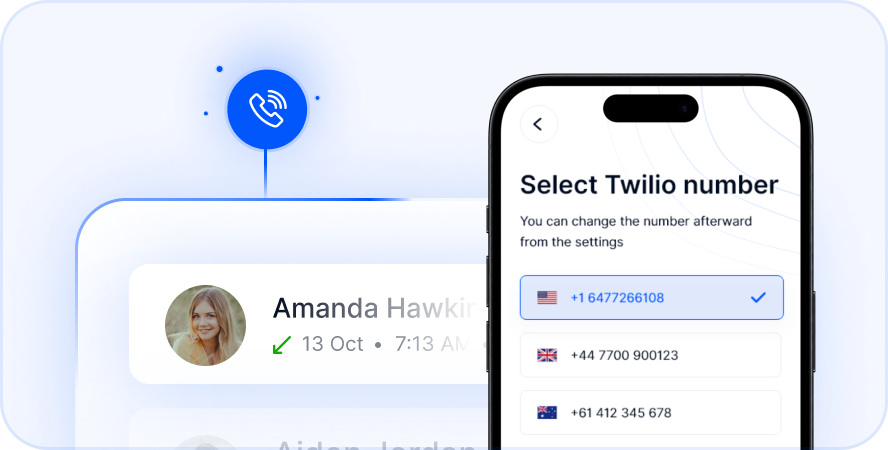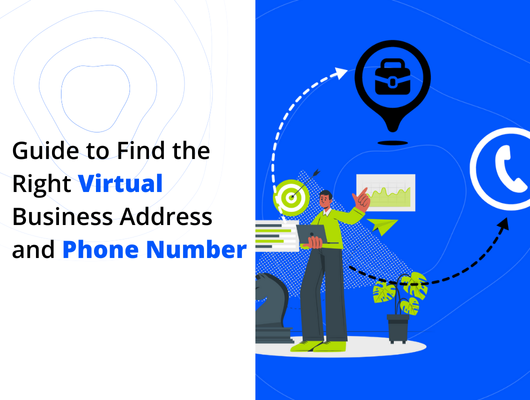Establishing a professional presence is key for any business, whether you’re a solopreneur working from home or managing a growing remote team. You can project an image of credibility and stability without the expense of a traditional office lease. This is where virtual business addresses and phone numbers become invaluable tools. They provide the necessary structure to operate smoothly from anywhere.
Understanding how these tools work and choosing the right ones is crucial for your business’s success and growth. They can significantly enhance your brand image, improve customer communication, and streamline operations. To explore the evolving landscape of remote work that makes these tools so relevant today, you can read more about the latest trends and statistics in a report from a reputable source like the U.S. Census Bureau on remote work trends. This guide will help you navigate the options and make informed decisions.
Why a Virtual Business Address is Essential (And More Than Just Mail)
A virtual business address offers significant advantages beyond just receiving mail. It’s a strategic asset that boosts your business’s standing and operational efficiency. This is especially true for businesses that operate primarily online or remotely. It creates a perception of professionalism that working from a residential address often cannot match.
Using a virtual address helps build trust with potential clients and partners. A location in a well-known business district signals reliability and legitimacy. This can be a major confidence booster for customers, particularly when dealing with newer businesses or startups.
Here are the core benefits:
- Establish Credibility: A physical street address, especially in a recognized commercial area, instantly elevates your business’s image. It makes your company appear more established and professional than using a home address. Clients often feel more comfortable doing business with a company that has a clear, professional location.
- Protect Your Privacy: Using a home address for business registration or public listing can expose your personal information. A virtual address provides a layer of separation, keeping your private residence off official business documents and public directories. This is a vital security and privacy measure.
- Cost-Efficient Operations: Traditional office space, especially in prime locations, comes with substantial costs like rent, utilities, insurance, and maintenance. A virtual address provides the prestige of a top location at a fraction of the price. It significantly lowers your operational overhead.
- Professional Mail Management: Virtual address providers offer services to handle your incoming mail. Options typically include mail forwarding to your preferred location, scanning important documents for digital access, and package receiving. This ensures you never miss critical correspondence, no matter where you are working.
The Importance of a Virtual Phone Number for Business
A virtual phone number for business goes beyond simply giving your company a phone line. It’s a tool that allows you to manage communication on the go, creating a seamless experience for your clients and your team. Here’s why you need one:
1. Stay Connected Anywhere
A virtual phone number isn’t tied to a physical location or device. You can take calls from your smartphone, computer, or even a tablet, wherever you are. This is essential for remote teams or businesses that operate globally.
2. Local and Global Presence
You can create local numbers in various regions or countries to appeal to customers in those areas. Clients are more likely to trust a local number, and with a virtual phone number, you can establish a local presence without being physically there.
3. Improved Customer Experience
Features like call forwarding, voicemail-to-email, and even automated attendants can help ensure your customers always reach the right person, regardless of whether you’re available to take the call directly.
4. Cost Savings
Using a virtual phone number can help you save on expensive international calling fees. It’s a budget-friendly solution that still delivers a professional communication experience.
5. Scalable for Growth
As your business grows, you’ll want a system that can scale with you. A virtual phone number allows you to add more lines or expand your reach to new regions easily.
The Power of a Virtual Business Phone Number
Just like a virtual address, a virtual phone number is more than just a contact line. It’s a flexible communication system designed for the modern business environment. It allows you and your team to manage calls and messages efficiently from various devices. This adaptability is key for maintaining consistent communication.
A virtual number is cloud-based, meaning it’s not tied to a specific phone line or physical location. You can make and receive calls using an app on your smartphone, desktop computer, or tablet. This provides unparalleled flexibility for remote workers, employees on the go, or dispersed teams.
Consider these significant benefits:
- Stay Connected Anywhere: Your virtual phone number rings on the devices you choose, allowing you to answer calls from your laptop at a coffee shop or your mobile phone while traveling. This ensures business calls are never missed, providing seamless availability.
- Create a Local and Global Presence: You can easily acquire virtual phone numbers with local area codes in different cities, states, or even countries. This allows you to establish a local presence in markets where you want to do business, making it easier for local customers to call you.
- Improve Customer Experience: Virtual phone systems offer powerful features like automated greetings (IVR), call forwarding to different departments or team members, voicemail-to-email transcription, and call queues. These features create a professional calling experience for customers and route calls efficiently.
- Reduce Communication Costs: Virtual phone numbers often provide more affordable rates, especially for long-distance or international calls, compared to traditional phone services. They can also eliminate the need for expensive hardware and maintenance associated with physical phone systems.
- Scalable for Growth: As your business expands, adding new virtual phone numbers or lines is quick and simple. You can easily assign numbers to new employees or set up lines for new regions without the complexities of installing physical lines. This adaptability supports business growth.

Choosing the Right Tools: What to Look For
Selecting the ideal virtual business address and phone number provider requires careful consideration. Not all services offer the same features or level of support. Thinking about your specific business needs and future growth plans is important before making a decision.
Finding providers that align with your brand image and operational requirements is key. Look at their track record, customer reviews, and the specific services included in their plans. A little research upfront can save you time and potential headaches later on.
For Your Virtual Address
Choosing the right virtual address impacts your business’s first impression. Consider these points:
- Location Reputation: The address location reflects on your business. Select a provider offering addresses in prestigious or relevant commercial districts that align with your target market and industry. Research the reputation of the specific building or address offered.
- Services Offered: Beyond basic mail receiving, check for services like mail forwarding frequency (daily, weekly), mail scanning for digital access, package receiving, mail storage duration, and potential access to meeting rooms or coworking spaces if needed. Ensure the provider can act as your registered agent if required for legal purposes.
- Affordability and Value: Compare pricing plans across providers. Look for clear pricing structures and understand any extra fees for services like excessive mail forwarding or scanning. Balance the cost with the value of the location and included services.
- Provider Reputation and Support: Read reviews about the provider’s reliability, customer service, and mail handling efficiency. You need a trustworthy partner to manage your important mail.
- Scalability: Can you easily change plans or add more addresses if your business expands or requires a presence in multiple locations?
For Your Virtual Phone Number
Your virtual phone number is central to customer communication. Evaluate providers based on:
- Key Features: Identify the essential features your business needs. Look for call forwarding, voicemail (with transcription), automated attendant (IVR), SMS messaging capabilities, call recording (ensure compliance), call analytics and reporting, and potentially features like call queues or ring groups.
- Integration Capabilities: Does the virtual phone system integrate with other tools you use, such as CRM software, email platforms, or calendar applications? Seamless integration can significantly improve workflow efficiency.
- Global Coverage: If you have or plan to have international clients or team members, check which countries the provider offers virtual numbers in. Ensure they cover the regions relevant to your business.
- Ease of Use: The provider’s dashboard and mobile app should be intuitive and easy to navigate. Setting up numbers, configuring call flows, and managing features should be straightforward.
- Reliability and Support: Downtime can mean lost business. Research the provider’s uptime history and the quality and availability of their customer support.sy to communicate with clients, colleagues, and partners across the globe. Download the Telfon App from Google Play store, App Store or Use Chrome Extension from Below.
Steps to Setting Up Your Virtual Presence
Once you’ve chosen the right providers for your virtual address and phone number, the setup process is generally simple. Following these steps will help you get your new professional presence online quickly.
Transitioning to virtual tools is a smooth process designed for modern business needs. You can often complete the setup within a day. This allows you to start presenting a polished image to your clients and partners almost immediately.
Here’s a breakdown of the typical steps:
- Assess Your Needs: Before choosing, define your requirements. Which location is best for your address? What phone features are essential for your daily operations? Knowing your needs guides your provider selection.
- Research and Select Providers: Based on your assessment, compare different virtual address and phone number providers. Look at their service offerings, pricing, reviews, and support options. Choose the ones that best match your specific requirements and budget.
- Sign Up and Choose Your Details: Once you’ve selected providers, sign up for their services. You will typically choose your desired virtual address location and select a virtual phone number (or port an existing one).
- Configure Your Services: Set up how your mail should be handled (forwarding, scanning). Configure your virtual phone number settings, including call forwarding rules, voicemail greetings, auto-attendant menus, and any other features you plan to use.
- Integrate and Update Information: Integrate your new virtual phone number with your CRM or other business tools if possible. Finally, update your business contact information everywhere – on your website, email signatures, business cards, social media profiles, and online directories.
Frequently Asked Questions
Many business owners have questions when considering virtual tools. Here are answers to some common ones.
These questions cover basic functionality and common concerns. Understanding the answers helps clarify how virtual services operate in practice. It ensures you can use these tools effectively for your business needs.
Q1. Can I use a virtual address for business registration?
Generally, yes. Most states and countries allow you to use a virtual business address as your official business address for legal registration purposes. However, always check the specific requirements of your local government and confirm that the virtual address provider offers this capability. Some may require a registered agent service, which providers often offer as an add-on.
Q2. Is a virtual phone number a “real” phone number?
Yes, a virtual phone number is a real, functioning phone number. It’s not just an extension or a redirect line. It’s a number that uses Voice over Internet Protocol (VoIP) technology to make and receive calls over the internet, rather than traditional landlines. It can receive calls from and make calls to standard phone numbers (landline and mobile) anywhere in the world.
Q3. How is mail handled with a virtual business address?
When mail arrives at your virtual address location, the provider typically sorts and notifies you. You can usually choose to have the mail forwarded to a physical address, scanned and emailed to you digitally, or held for pickup (if the service is offered). Package handling services may also be available, though often with size or weight restrictions.
Q4. What are the most important features to look for in a virtual phone number?
Essential features include reliable call forwarding to any device, professional voicemail with transcription options (voicemail-to-text), and an automated attendant (IVR) for routing calls. SMS capabilities are also increasingly important for business communication. If you deal with many calls, features like call queues and call recording can be highly valuable.
Maximizing Business Success with Virtual Tools
Integrating a virtual business address and phone number is a smart step for any modern business. These tools provide the flexibility needed to operate efficiently from anywhere while projecting a polished, professional image. They are particularly powerful for remote teams, startups, and businesses looking to expand their reach without significant investment in physical infrastructure.
By leveraging these virtual solutions, you enhance your credibility, protect your privacy, and streamline communication. This leads to improved customer satisfaction and operational efficiency. Choosing providers that offer the right mix of location prestige, essential features, reliability, and affordability is key to unlocking the full potential of virtual business tools.
Finding the right virtual phone system is crucial, and platforms like Telfon offer many of the features modern businesses need. They provide virtual numbers in numerous countries, essential communication features like SMS and voice.













